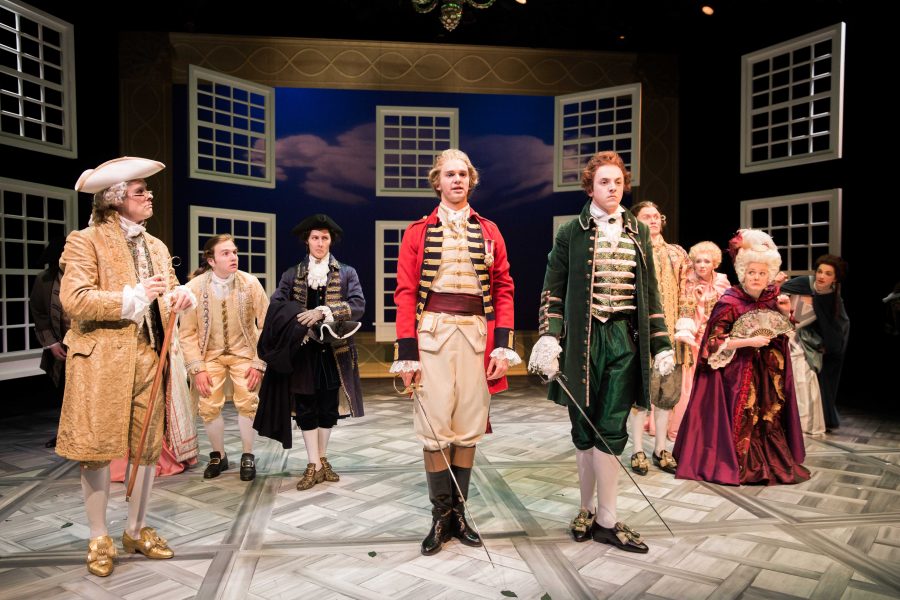Art vs. The System: The Morality of Bootlegs
October 24, 2019
Let’s set the stage: it’s 2019. The musical, “Hamilton,” has long since garnered accolades and publicly denounced Mike Pence. The cast has transformed several times and traveled around the country, stealing hearts in every state. Of course, you know this, because if you love the musical, you’ve seen it. Right? Let’s be honest, fellow indebted college student, if anything, you know this information because of the internet. If you’re anything like me, you may have even found a link to a video that suggested it didn’t lead to an illegal recording of “Hamilton.” Spoiler: it was definitely a “Hamilton” bootleg. The question is not whether this content is legal — it certainly is not — but whether or not we can sleep at night knowing that we watched illegal Broadway recordings. Is it right?
Calling out Classism
Many of the best, recent Broadway productions are exclusive. They don’t cater to the general public. Even when they spring from their New York cradle, off-Broadway musicals take months of planning and saving for the majority of families, if they can afford to go at all. BroadwayHD, a streaming service for Broadway performances, helps to disperse content, but their fee competes with other streaming services. They also don’t carry many shows, let alone ones from recent seasons, so there’s no guarantee you’ll see the shows you want.
Broadway actress Stephanie Block, in response to the debate surrounding the illegal recordings of shows, tweeted about discount sites and other ways to save money on tickets. According to her, “Broadway is a special place and a special experience, but if planned and saved for, it can be enjoyed.” This helps for tickets, sure, but it misses the cost of travel and staying in New York in order to attend the elite theatre. For some, watching the cream of the crop will always be unattainable. At its core, this debate is no doubt a socioeconomic issue. According to the Internet Broadway Database, 75% of attendees in the 2017-18 season were caucasian and 81% had completed college. It’s still a rich, white game. If that doesn’t say enough, the average annual income was $222,120, whereas the average for Utah then was $68,358. In other words, excuse the masses for dabbling on YouTube.
Taking Dough From The Starving Artist
There’s also the question, and probably the most important one, of how bootlegs affect the artists involved. After all, they’re subject to the same system as the rest of us, and they’ve probably been screwed by it, too. Actors have gone on record denouncing recordings of their shows. It’s disrespectful, it’s distracting. How can you argue with that? Really, I’m asking, because I would love to watch bootlegs guilt-free. There’s the hypocritical rub: somehow it’s a lot less despicable to watch illegal content than to record it, although we’re also culpable because our interest in watching these videos encourages it. So it’s difficult to justify filming, knowing you risk taking the actor or the audience out of the moment, but it’s still not stealing from the artists financially. The people watching YouTube are primarily the ones that cannot afford to see the shows in person, meaning that it’s not a substitute, it’s the only option. They’re not taking from the profits of all the artists involved.
Part of the reason for this comes down to the quality of these recordings, which wouldn’t replace the experience. Even us laypeople can tell that this grainy, bouncy, out-of-focus video does not represent what the artist intended. In a nutshell, that’s the point made by Lin-Manuel Miranda, the creator of Hamilton. Back in 2015, Playbill.com released a piece about Miranda’s response to someone searching for a bootleg. He had a solution to the audio portion: a gorgeous, immersive album recorded by the original cast. Most of us can probably get behind the music side of his argument. If we can afford to stream other music legally, we could easily include musical recordings into that.
“I’m thrilled you haven’t heard a shitty, half-iPhone recorded version yet,” he said, “because I spent six years writing this and when you hear it, I want you to hear what I intended. I’m sorry theater only exists in one place at a time but that is also its magic. A bootleg cannot capture it.”
Mr. Lin-Manuel Miranda, I completely agree with you. We would certainly rather watch the final product in all of its singular glory. Mr. Lin-Manuel Miranda, we would rather see what you intended. But, Mr. Lin-Manuel Miranda, you’re not in the show anymore. Some of us will chance to lose the momentary magic if it means we get to experience the magic of finally watching you perform from our living rooms. I promise it won’t spoil or detract from the real thing if we ever have the chance to see the show live.
We’re keeping our passion for these productions on life support. In watching them, we become unbearably aware of how inadequate the quality is, which only revives the initial interest in the actual flesh-and-blood show. Think about mass-produced media. Don’t you still take away something new from your favorite movie even after the millionth viewing? Or for you, theatre aficionados, don’t you find a new detail in every production of your favorite show? Watching a production from poor quality iPhones won’t spoil our appetite.
Not Throwing Away Our Shot
I think there’s something that would definitely be lost if the current cast of a show were to be leaked online. For people who have the opportunity to see the performance, all of the carefully crafted energy loses its spark if audiences know what to expect. The cast loses the chance to share present tension with a present audience. So maybe there’s room for an exception as well. There’s an expiration date for casts, and after that their magic truly will be lost unless recorded.
Reproduction doesn’t preserve the aura around art, and in some ways, it would be better to let a show disappear forever than to try to keep it alive. You just had to be there. But then, that’s the case with all art. All art tries to capture and preserve something elusive and ephemeral. In other ways, it would be better to capture a piece of the action so that those on the outer wings can witness a small part of it.
Those performances will never come with those casts again. We’re no longer cheating them. We might be losing the aura of the moment, but we understand the characters, the dynamics, the themes better in their natural habitat. We can agree it’s only a substitute, but why be criticized for it? Why be robbed of the very least? Punished and pursued for bread? But that’s another musical, and until someone risks adulterating “Hamilton” with a legal, Hollywood camera, we should be able to revel in our favorite theatre. We should be able to dream of the day when we might be one of those heads blocking the camera of the next bootlegged video.








